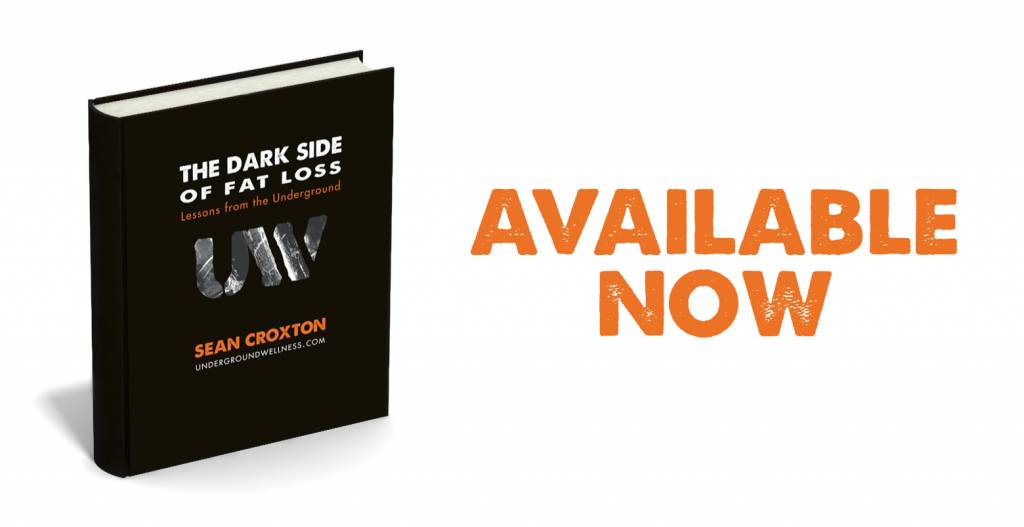 by Sean Croxton
by Sean Croxton
So, last night I burned through the first half of Wheat Belly while half-watching the Philadelphia Eagles blow yet another game.
While reading, I figured that I should probably make a video about how wheat makes us fat and is actually worse (from a blood sugar perspective) than consuming sugar.
Kinda ironic when we’ve been told to ditch the simple sugars (table sugar, for example) for more complex carbohydrates (wheat!).
This ridiculous dietary recommendation has only served to create more obesity, diabetes, heart disease, and more.
Check out the video below, as I drop truth bombs about how wheat makes you fat!
To learn more, pick up the book Wheat Belly by Dr. William Davis.
While you’re at it, listen to my podcast with Dr Davis HERE.
See you tomorrow!
Sean Croxton
Author, The Dark Side of Fat Loss


Right on Sean! Good info.
Thanks, Scott!
I’m not sure if it is exactly the same, but WSJ Health Journal did an article today about how carbohydrates may be causing Irritable bowel syndrome
http://online.wsj.com/article/SB10001424052970204554204577023880581820726.html
I am studying nutrition as well and I am curious. I know you mention that whole wheat has a glycemic index of 77 and white has a glycemic index of 80. Not so different I agree. But what can you tell me about time of digestion and total quantity absorbed? From my understanding, the fiber and protein content in the whole grain makes the process take longer then white bread. Making a person feel “Full” for a longer period of time. So instead of going back for another serving of white bread, we’re still satisfied with the wheat bread we had 4 hours ago. In this instance, the glycemic load is cut in half. 77 over 4 hours is a lot less than 80 over 2 hours. In the same time period the glycemic load is more than doubled. I’m not claiming to be right on this, but I want to hear your take on the subject. There is a difference between glycemic index and glycemic load when it comes to processing time correct? What can you tell me about that?
Nice video Sean, I agree with some of things you said but as always some of this information may not be correct. Yes you wrote a book and you don;t have time to explain all the chemical process in a 10 min video but certain things need to be analyzed.
1) Context. Eating a slice bread for a metabolically efficient person will not result in wheat belly. Just like drinking one beer will not make you drunk. 10 beers in one hour = stupid facedd, 10 beers over 10 hours = sober as a nun. Also the rate of absorption and transportation is different for everyone(although it shouldn’t be). Someone who is insulin sensitive and not leptin resistant will not have BS levels elevated over 100 and in fact this is why there is fiber in theses foods and when you add fat or protein with them you get different results. once again context is very important. I think you are speaking to overweight Americans and not your typical lean college student who eats whatever they want with very minor health problems.
2) the Glycmic index is for diabetics not fully functioning human beings. Comparing whole wheat bread to table sugar makes zero sense.
“It is perfectly true, as has been shown previously (Chapter II), that the calories in, for example, an apple are much the same as those in a teaspoonful of sugar, and therefore at first sight the danger in cases of obesity would appear to be the same in each. But, as was pointed out, there is an enormous difference between the two in one vital respect — the amount a person needs to consume of each before the appetite is appeased. As already said, a person may over-consume sugar very easily — but not apples”- TL CLeave and John Yudkin
3. When people were expected to go on a low fat diet did they start eating more complex carbohydrates? from the data I have seen the amount of whole grains and starch we eat has dropped since 1909. Whats gone up? Sugar consumption and vegatbale oils. Blaming “complex carbohydrates” is not fair because American have stripped them of fiber and magnesium.
4. You can’t ignore the people who have lost weight eating grains and wheat. http://www.drmcdougall.com/star.html I’m not a vegetarian but putting the blame solely on grains and wheat is not fair. Remember when we used to blame saturated fat for all problems…look how that turned out, blaming grains is not different.
5. I think the message you are trying to promote is don;t eat junk food. Don’t put natural whole wheat pita bread into the same category as a bagel or a preztal just because they have similar glcemic index. The context of that food is VERY diffrent as TL Cleave pointed out and many health researches who saw this shift from unrefined carbohydrates to refined carbohydrates.
As always keep up the good work, but really analyze the context of what you are saying as grains may promote obesity in one person but not in another. I think the title of the book should have been leptin resistant belly or 11β-Hydroxysteroid dehydrogenase belly. Understanding bio chemistry is much more important then putting sole blame on one substance. Fiber is your friend, grains are not the enemy and Obesity = starvation.
-JERF
Applaud to JERF Great response!!
I know how this goes. We’re going to go back and forth for ten days on these matters. I’ll just say this:
* The glycemic index does NOT only apply to diabetics.
* You quote a lot of Cleave. While still relevant, it’s really old work. Cleave died when I was 6.
* I’m not talking about ALL complex carbs. I’m talking about wheat!
* At what point in the video did I blame obesity “solely on grains”?
* Like you say, context is important and I can’t explain everything in a 10-min video, but let’s be honest, how many metabolically efficient people are there out there?
* I work with real people. And when you work with real people (and not just read books), you find out that people who eat a lot of wheat end up gaining weight and feeling terrible. When the wheat is removed, they lose weight and feel great. I don’t have to read a 20 year old book to know this.
I can understand your passion for this topic of nutrition and health, but try not to put words in my mouth or take things completely out of context by inserting your own meaning.
Again, no one put the “sole blame on one substance” besides you. Did you watch the entire video? At the end, I encouraged the audience to NOT have tunnel vision and to explore the other causes of insulin resistance (which I listed). I have a feeling you didn’t get to that part.
Gluten IS the enemy for a LOT of people. Gluten is in most grains. And fiber can come from fruits and veggies, too.
And I do agree that obesity does result from starvation and leptin issues for a lot of people.
The rest of what you wrote just seems like a guy trying his hardest to debate.
By the way, in my interview with Dr. Davis, he said that there is some research showing that wheat consumption contributes to leptin resistance.
Joe, I think there is another way to look at your points. (1) any form of calorie restriction can help you lose weight, example: the twinkie diet (2) weight loss alone doesn’t tell you where the weight was lost, like organs and muscles (3) weight loss alone is a terrible metric for evaluating health as the quality of your diet, activity level, strength, stamina, energy level, sex drive, etc. are not reflected in that data (4) starvation diet over a long period cause a stress response which can be unhealthy (5) any diet must be looked at in the long term, and as such, how much weight you lose is irrelevant but what is more important is weight maintenance and how you can promote satiety effectively without overeating (6) grains and sugar and soft foods make you overeat, and this is why processed food companies make them (7) there are many clever rearrangements out there of food which are actually essentially soft drinks and candybars doused with vitamin powder (8) If it’s bad for a diabetic it IS bad for you–I know a lot about this as I have type I diabetes in my family and I simply understand from checking blood sugars what works and what doesn’t (9) I am not diabetic but I did Dr William Davis’ test and my blood sugar went to 120 (on pop in went to 140) (10) Ultimately, no one can make you change any belief that you have, only you can change your beliefs, and as a result, you simply have to try it and see. (11) most people who have tried Dr. Davis’ approach feel this way–try it, if you like, and you will see results–but the grain producers, processed food, etc. and the USDA don’t. They want you to eat a penny’s worth of product and pay 4 dollars for it. Why wouldn’t they?